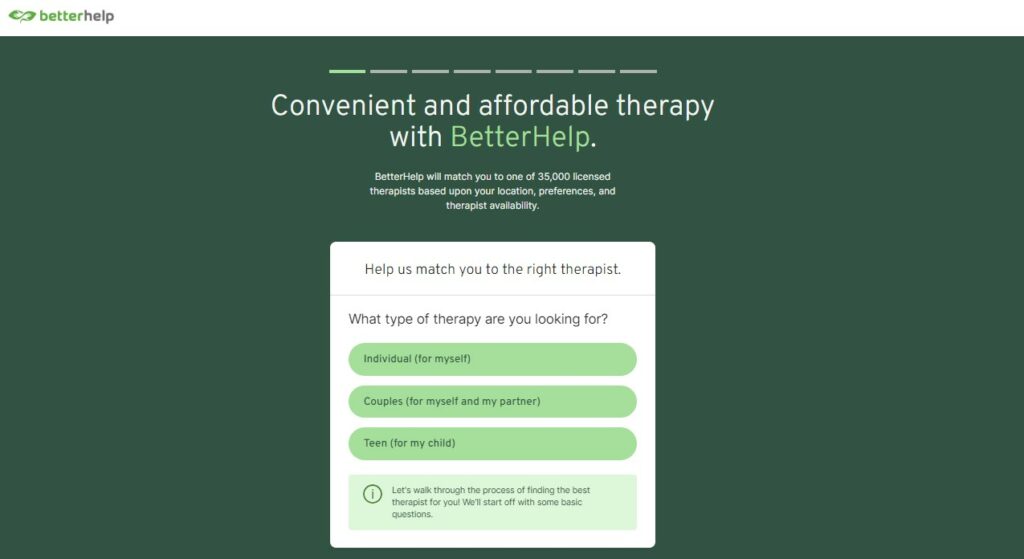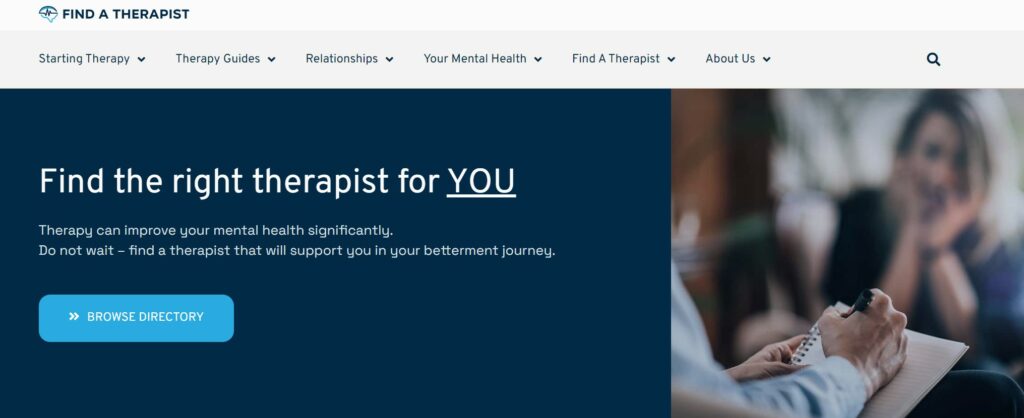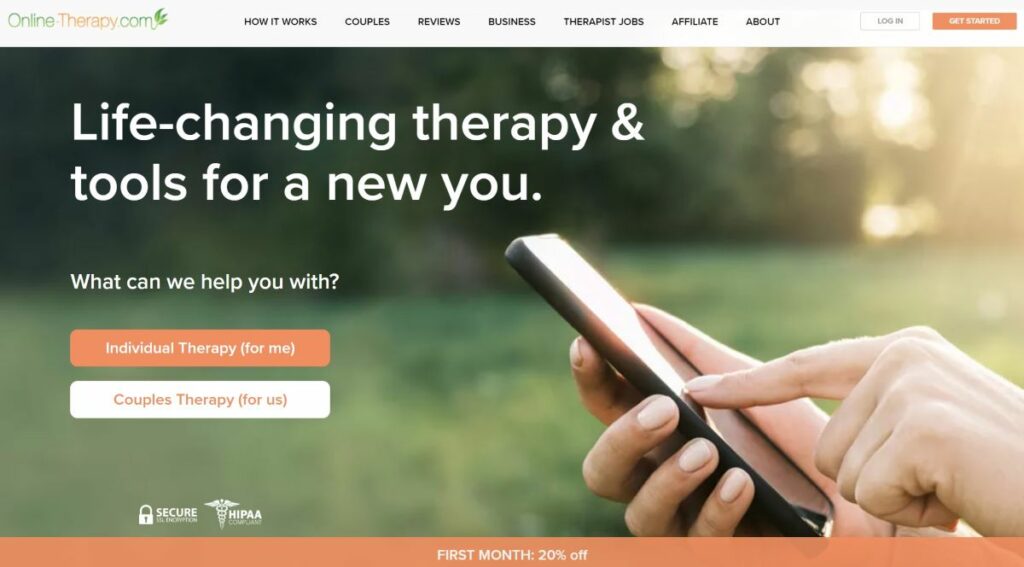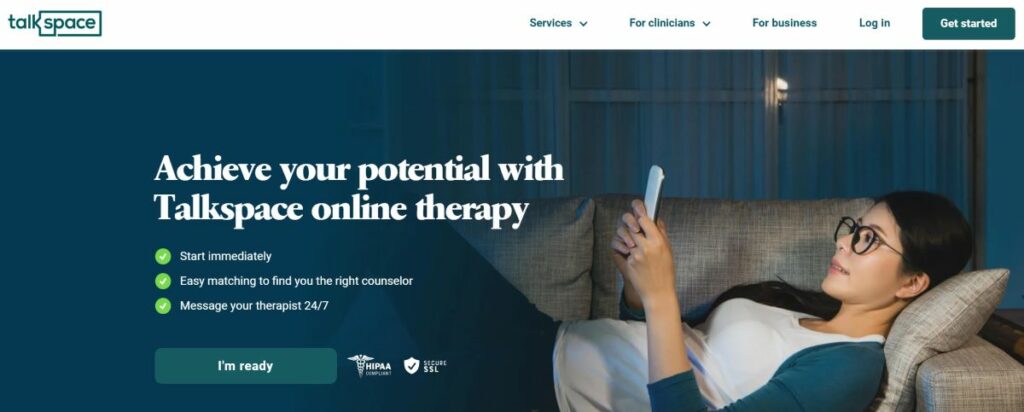Having a social anxiety disorder can be crippling. As social animals, we need to mingle with others, but for a variety of reasons – trauma, autism, and abuse among them – many of us feel serious anxiety in social situations.
It is possible to be trained on how to face social anxiety, and make social situations more tolerable for you. In this article, we will look at six of the best websites to find social anxiety counseling and psychotherapy, to help you find the best online or in-person provider for your specific needs.
Want to skip right to the suggestions for social anxiety therapists? Here are our 6 recommended therapy solutions:
- BetterHelp
- Find-a-therapist.com
- Online-therapy.com
- Calmerry
- TalkSpace
- Anxiety & Depression Association of America (ADAA) Therapist Directory
Social anxiety therapists near me/online
Below, we’ve looked at six different platforms to help you find a social anxiety therapist. Some of these platforms offer online therapy considering for some people this type of therapy can be more accessible and affordable.
| Povider | Good For | Location | Pricing |
|---|---|---|---|
| BetterHelp | Quick match with the right therapist four you | Online therapy | $65 to $90 per week (billed every 4 weeks) |
| Find-a-therapist.com | Finding and contacting the right therapist for you | Online and in-person therapy | Varies depending on the counselor fee |
| Online-therapy.com | Finding licensed and experienced therapists with a Cognitive Behavioral Therapy (CBT) approach | Online therapy | $40/week to $88/week (including our 20% discount first month) |
| Calmerry | Depression therapy, online grief counseling, anxiety therapy, therapy for OCD, self-esteem therapy | Online therapy | $49.50 to $73.75 per week (billed monthly) |
| TalkSpace | Depression, anxiety, bipolar disorder, OCD, PTSD, LGBTQIA+ therapy | Online therapy | Varies according to insurance coverage or self-pay options |
| Anxiety & Depression Association of America (ADAA) Therapist Directory | Finding the right social anxiety therapist for you | Online and in-person therapy worldwide | Varies depending on the counselor fee |
1. BetterHelp

Explore emotional well-being with BetterHelp – your partner in affordable online therapy. With 30,000+ licensed therapists and plans starting from only $65 per week, BetterHelp makes self-care accessible to all. Complete the questionnaire to match with the right therapist.
- Good for: Quick match with the right therapist four you.
- Location: Online therapy.
- Pricing: $65 to $90 per week (billed every 4 weeks).
- Features: iOS and Android app available, message your therapist anytime, live sessions are scheduled weekly and done via live chat, phone, or video call.
BetterHelp is an online therapy provider with a large number of therapists specializing in helping people overcome social anxiety. The initial sign-up process at BetterHelp is simple and straightforward. You complete an online questionnaire and BetterHelp will assign you a social anxiety therapist who has experience helping others with similar disorders or problems to what you have described.
Read our BetterHelp review here.
2. Find-a-therapist.com

- Good for: Finding and contacting the right therapist for you.
- Location: Online and in-person therapy.
- Pricing: Varies depending on the counselor fee.
- Features: Filter your search, find accessible and effective online and in-person therapy, find guides on different types of therapy.
Find-a-therapist.com is an online directory with a range of qualified therapists and counselors. There you can filter your search according to your preferences and find therapists like Annel Gomez and Jane Perkins who have experience in addressing social anxiety.
3. Online-therapy.com

Discover transformative online therapy with Online-therapy.com. Through cognitive behavioral therapy (CBT), Online-therapy.com offers individual and couples support starting at $45/week. Engage in sessions via video, voice, or text for maximum flexibility. Fill out their online questionnaire to get started.
- Good for: Finding licensed and experienced therapists with a Cognitive Behavioral Therapy (CBT) approach.
- Location: Online therapy.
- Pricing: $40/week to $88/week (including our 20% discount first month).
- Features: Unlimited messaging with your therapist, including a daily journal and activity plan, yoga and meditation videos, and tests to see your progress.
Online-therapy.com is another specialist online counseling platform that can help connect you with a qualified therapist or psychologist, who has experience helping those who suffer with social anxiety. The platform will offer you a therapist according to criteria such as the psychological difficulty you face, your schedule, and any personal preferences in a therapist.
Read our online-therapy.com review here.
4. Calmerry

Embark on a journey of mental wellness with Calmerry. With diverse subscription options, starting at just $50, Calmerry makes prioritizing your mental health simple and accessible. You can message your therapist any day or schedule a live therapy session from the comfort of your home from any device.
- Good for: Depression therapy, online grief counseling, anxiety therapy, therapy for OCD, self-esteem therapy.
- Location: Online therapy.
- Pricing: $49.50 to $73.75 per week (billed monthly).
- Features: Message to your counselor anytime, text therapy and video therapy according to the plan you choose, free counselor switching.
Calmerry is an online platform that connects you with licensed therapists and counselors with experience in managing different mental health issues, including social anxiety. This platform offers you two types of therapy via text message (live chat) or video therapy.
Read our comparison between Calmerry and BetterHelp here.
5. TalkSpace

Tailored to individuals, couples, teens, and offering psychiatry services, Talkspace plans kick off at a wallet-friendly $69 per week. What’s more, many health insurances also cover their services, enhancing accessibility and affordability. Complete a questionnaire and get matched with the right therapist for you.
- Good for: Depression, anxiety, bipolar disorder, OCD, PTSD, LGBTQIA+ therapy.
- Location: Online therapy.
- Pricing: Varies according to insurance coverage or self-pay options.
- Features: Accepts insurance, pick your therapist from a list of recommendations, live video sessions and unlimited messaging with your therapist, medication management.
On TalkSpace, you can select your therapist from a list made for you considering your answers in a short questionnaire. Therapists on this platform are licensed and qualified and have experience in diverse issues including social anxiety.
Read our TalkSpace review here.
6. Anxiety & Depression Association of America (ADAA) Therapist Directory

- Good for: Finding the right social anxiety therapist for you.
- Location: Online and in-person therapy worldwide.
- Pricing: Varies depending on the counselor fee.
- Features: Online directory, choose and contact your therapist directly, find evidence-based educational resources in the website.
The Anxiety and Depression Association of America offers a therapist directory – you work directly with the therapist, rather than through a specific online platform. You don’t have to pay a fee to make contact with the professionals, but you will pay them directly once you have decided to work with them.
What is Social Anxiety?
Social anxiety, also known as social anxiety disorder (SAD) or social phobia, is a mental health condition characterized by an intense and persistent fear of social situations and interactions.
Individuals with social anxiety often experience overwhelming worry and self-consciousness in social settings, leading to avoidance behaviors.
Signs That Your Social Anxiety is a Problem
Here are some signs that your social anxiety is becoming a serious problem, and it may be worth seeking help:
- Physical symptoms such as blushing, sweating, and a racing heart
- Constant anxiety over social situations
- Feeling panicked in public places that you cannot leave easily (this is known as agoraphobia)
- Consistent worry over negative feedback, such as at work
- Intense fear of meeting others
- Being less easy to talk to, as you are defensive/overtly anxious
- Low self-esteem
These are signs that rather than a bit of stage fright before a show, you may have a serious mental health concern that could amount to social anxiety disorder.
One important thing to remember is that your social anxiety therapist must always treat what they hear from you as confidential. This ensures that your personal reputation is not at risk, in turn reducing any potential embarrassment in getting the help you need. Some people choose online mental health therapy because it can be done anonymously, under a pseudonym.
By getting treatment before your social anxiety becomes too disabling, you can avoid it becoming an issue that seriously affects your relationships, career, and life in general.
When Should I See a Therapist for Social Anxiety?

Social anxiety can be innate due to another condition such as autism or ADD, or it can come about as a result of abuse, family conflict/dysfunction, or trauma. Social anxiety is the third most common mental health problem in the US.
You should seek support for social anxiety when you feel that the time is right – not when guided by some imaginary measuring post that has a red line drawn on it by someone you do not know. When social anxiety negatively affects your life, then it’s time to start thinking about getting help.
For many people, the trigger for seeking help with social anxiety is often when things are so far advanced that they need a lot of support and treatment to get their life back on track. This results in the development of a serious social anxiety disorder, which can mean complete avoidance of social situations, resulting in relationship and family issues. In these types of circumstances, it may have been a better idea to seek help a little earlier.
However, it’s also important to note, social anxiety affects everyone to some extent. A little anxiety can help you perform well – like the nerves before a job interview that for some people, helps them perform better. But when the anxiety gets to the point that it impacts your social and family life, then it might be time to look for help from a mental health professional.
What Treatments Exist for Social Anxiety Disorders?

Because having a social anxiety disorder is so common, a lot of time and money has been spent in the mental health community on developing treatments for the issue.
Cognitive behavioral therapy (CBT) is often seen as the preferred treatment for social anxiety, but increasingly group therapy has been shown to help too.
We will now look at both of these treatments, helping you decide which route you would prefer to take.
Cognitive Behavioral Therapy (CBT)
After agreeing to work with your psychologist or counselor, you will first discuss with them the issues you face and how they affect your behavior. Working together, you will find positive ways to challenge these behaviors and negative feelings that come with social anxiety.
The work you do in CBT is a form of psychological education – after therapy, you will apply the lessons learned in the real world, and reflect on them. You won’t always apply the methods you have learned perfectly, so you will consult with your therapist in order to improve your skills.
As with learning to drive a car, the idea behind CBT is to hone the psychological skills you’ve learned to the point that they don’t need much conscious thought, helping your performance in social situations to improve.
One reason cognitive behavioral therapy is held in such high regard in dealing with social anxiety is that the results are often very rapid. You may see changes in your behavior occur after just a few sessions.
Group Therapy
A lesser-known therapy for social anxiety, but still recognized as an effective technique for tackling the issues around it, is group therapy.
By interacting with others who also have social anxiety, you can practice forming social bonds and together learn how to tackle your common issue.
Some forms of group therapy involve physically gathering for an in-person meeting, with a counselor or counselors, or attending a lecture or educational event. Group therapy does not always involve physical gatherings though – it can also involve online chat rooms and video calls. As a result, group therapy can still be a very accessible way of getting help from the comfort of your own home.
Though there is a level of anonymity involved in group therapy, therapeutic relationships are formed between participants as well as between yourself and your therapist. If all goes well, participants end up helping each other, supported by the expertise of the mental health professional.
Conclusion
Online social anxiety therapy through online platforms such as the ones mentioned above can be cheaper and more accessible when compared to some forms of traditional therapy. On these platforms, the therapists’ qualifications and licensing have all been checked, so your due diligence process is much easier when looking for a therapist. Plus, it’s easy to schedule sessions and contact your therapist.
Still unsure how best to find social anxiety therapy for your specific needs? Feel free to contact us and we will help out.





